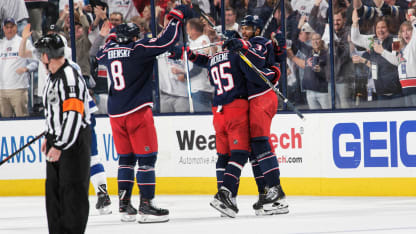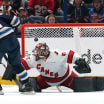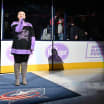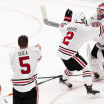Get John Tortorella in an honest moment late in the Blue Jackets season and you'd likely hear a version of this tale.
The Columbus head coach knew all season he was in charge of a good team. But just how good would be determined by one factor, the same factor that seems to decide whether any hockey team makes the jump from good to great.
At some point, his young team would have to answer to each other rather than the coaching staff. It's that bond between players -- when it reaches a point where they aren't afraid to call each other out when it needs to be done, but still an environment where each teammate supports the other as well -- that can create a team that can do great things.
So midway through Game 3 at Nationwide Arena in the opening series vs. Tampa Bay, Tortorella couldn't help but stand back and smile.
Playing for each other has pushed Blue Jackets to new heights
Columbus credits mindset, belief, unity for success

"I'm standing behind the bench and we're talking about some backchecking things we need to do to play against (the Lightning), and I'm listening to the bench when some guys aren't doing it, and I don't have to say a word because it's coming from them," Tortorella said. "I looked at (assistant coach Brad Larsen) -- this was Game 3, and I heard people screaming at each other to backcheck, and for a coach, it's really cool to see that.
"Usually it's the coaches doing all the yelling about that. But you could see that they had an opportunity against a really good team, and they didn't want to see this go by."
At the right time, it appears Tortorella has a team that has that special chemistry that can push a team through the grind of the sport's most difficult postseason.
Time will tell what this will mean in the end, but the Blue Jackets are in a good spot as they await their second-round opponent simply because of the mind-set in the room -- and how the players now have to answer to each other.
"I just think that the leadership and the experience we have on this team, having reminders from our peers is really good," center Matt Duchene said. "It shouldn't always be the coach saying something or the principal saying something, the teacher saying something - you know what I mean. It's always good as a group to remind each other what it takes."
So where does that come from? Duchene has a bit of a theory.
"Everyone is doing their job," Duchene said. "Everyone is looking themselves in the mirror and taking it upon themselves to be a difference maker, whether it's a blocked shot, a hit, a goal, a backcheck, a save. It doesn't matter what it is. That's what it takes. You can't look to your neighbor to carry you. You have to take it upon yourself."
Remember, this is a team that entered the season as the NHL's youngest, but it is also a squad that is now in its third consecutive playoff run, with a core cast of characters that has been around for each of the previous two appearances.
So there has been a learning curve there, and perhaps with that a leadership curve. A number of young players like Seth Jones, Zach Werenski Oliver Bjorkstrand and Josh Anderson have gone from getting their feet wet in their first or second NHL seasons to counted-on pieces of the puzzle, and those players don't seem to be shrinking from the importance of the moment.
And perhaps it's no coincidence the Blue Jackets' recent run of success -- 11 wins in the last 12 games dating back to the regular season -- started after a couple of days off and a team dinner in Vancouver. Captain Nick Foligno was not with the team as it tried to battle out of a three-game losing streak that had put it on the wrong side of the playoff line, and that's where the team found its legs.
It's almost impossible to replace what Foligno provides in terms of leadership, but as the team went through a critical phase without him, growth couldn't help but occur.
"It was great," Foligno said near the end of the season. "I'm really happy that they kind of figured it out on their own, too, and I wasn't around. And they had to talk more. I think a lot of the time I'm the one speaking, and I don't want to all the time. It forced other guys to have to say some things, and they embraced it and they ran with it and obviously turned this thing around."
Now, with a playoff series win under the team's belt, Foligno is ecstatic to see how the team has come together. For example, there's the backchecking commitment that so thrilled Tortorella.
"That's where I think you're seeing the huge growth of our team and our team taking ownership and becoming a team," Foligno said. "Everyone is pulling the same rope. Certain individuals have certain skills that others don't, but we expect the same brand and style (of hockey), and that's what we're harping on."
Tortorella has made it clear repeatedly during the postseason that he views mind-set as perhaps the most important thing a team can have. Sure, X's and O's are important, as are matchups, but a team that doesn't win the mental battle isn't going to have success in the playoffs.
Through one series, his team has it, and now it appears to believe anything is possible as it battles for the guy next to them on the bench.
"A collective belief is a very dangerous thing," Tortorella said. "You can get a lot of things accomplished by a collective belief."


















